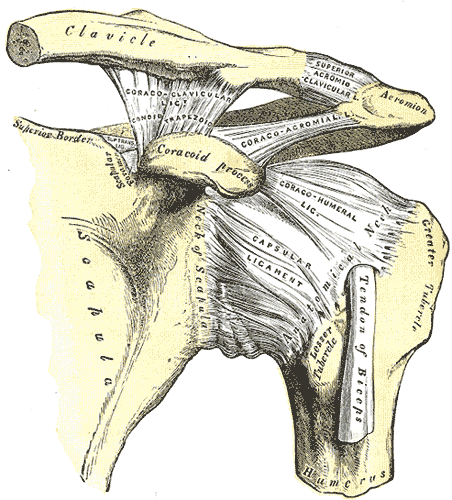◔
Acromioclavicular Joint: Difference between revisions
From WikiMSK
No edit summary |
No edit summary |
||
| Line 1: | Line 1: | ||
{{Joint | {{Joint | ||
|image=Shoulder and acromioclavicular joint with ligaments gray.png | |||
|caption=Left [[Glenohumeral Joint|shoulder]] and acromioclavicular joint | |||
|quality=Stub | |quality=Stub | ||
|type=Synovial Joint | |type=Synovial Joint | ||
| Line 10: | Line 12: | ||
|vasculature=Suprascapular and thoracoacromial arteries | |vasculature=Suprascapular and thoracoacromial arteries | ||
|conditions=[[Acromioclavicular Joint Osteoarthritis]], [[Acromioclavicular Joint Injury]] | |conditions=[[Acromioclavicular Joint Osteoarthritis]], [[Acromioclavicular Joint Injury]] | ||
|volume=2mL | |||
}} | }} | ||
The acromioclavicular joint (ACJ) is formed by the junction between the acromion and the clavicle. It is a plane synovial joint and forms part of the shoulder girdle (See [[Shoulder Biomechanics]]). | |||
[[Category:Shoulder Anatomy]] | [[Category:Shoulder Anatomy]] | ||
Revision as of 14:39, 2 April 2022
This article is a stub.

| |
| Acromioclavicular Joint | |
|---|---|
| Primary Type | Synovial Joint |
| Secondary Type | Planar Joint |
| Bones | Scapula, Clavicle |
| Feature | Fibrocartilaginous wedge-shaped disc. |
| Ligaments | Coracoclavicular, coracoacromial, superior acromioclavicular, and inferior acromioclavicular ligaments. |
| Muscles | No muscles directly act on this joint. |
| Innervation | Axillary, suprascapular, and lateral pectoral nerves |
| Vasculature | Suprascapular and thoracoacromial arteries |
| ROM | |
| Volume | 2mL |
| Conditions | Acromioclavicular Joint Osteoarthritis, Acromioclavicular Joint Injury |
The acromioclavicular joint (ACJ) is formed by the junction between the acromion and the clavicle. It is a plane synovial joint and forms part of the shoulder girdle (See Shoulder Biomechanics).

